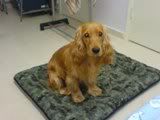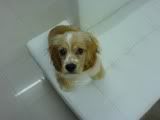Emily
(Emily)
英曲專家
           
你係我快樂o既來源~ mousse
UID 24
精華
0
積分 3884
帖子 3880
閱讀權限 250
註冊 2005-10-1
所養英曲名稱:Mousse / Sabu
英曲會員編號:
狗狗性別:M
狗狗出生日期:18/9/2004, 30/10/2005
狗狗最喜歡:蝦阿媽! 破壞! 出街玩! 食食食!
狗狗最討厭:困籠! 無街去!
狗狗技能:食極都唔飽
狗狗性格:活潑 = 癲?
居住地區:青衣
來自Mousse & Sabu ~ 溫馨的家
狀態 離線
|
隻狗惡, 兇人原因
一, 自以為大,
二, 害怕.
三, 保謢, 地盤, 佔有
Understanding Aggressive Dog Behavior
Dog aggression is any behavior meant to intimidate or harm a person or another animal. Growling, baring teeth, snarling, snapping and biting are all aggressive behaviors. Although aggressive behaviors are normal for dogs, they're generally unacceptable to humans. From a dog's perspective, there's always a reason for aggressive behavior. Because humans and dogs have different communication systems, misunderstandings can occur between the two species. A person may intend to be friendly, but a dog may perceive that person's behavior as threatening or intimidating. Dogs aren't schizophrenic, psychotic, crazy or necessarily "vicious" when displaying aggressive behavior.
Because aggression is so complex, and because the potential consequences are so serious, we recommend that you get professional in-home help from an animal-behavior specialist if your dog is displaying aggressive behavior.
Types of Aggression
Dominance Aggression: Dominance aggression is motivated by a challenge to a dog's social status or to his control of a social interaction. Dogs are social animals and view their human families as their social group or "pack." Based on the outcomes of social challenges among group members, a dominance hierarchy or "pecking order" is established.
If your dog perceives his own ranking in the hierarchy to be higher than yours, it's likely that he'll challenge you in certain situations. Because people don't always understand canine communication, you may inadvertently challenge your dog's social position. A dominantly aggressive dog may growl if he is disturbed when resting or sleeping, or if he is asked to give up a favorite spot, such as the couch or the bed. Physical restraint, even when done in a friendly manner, like hugging, may also cause your dog to respond aggressively. Reaching for your dog's collar, or reaching out over his head to pet him, could also be interpreted by him as a challenge for dominance. Dominantly aggressive dogs are often described as "Jekyll and Hydes" because they can be very friendly when not challenged. Dominance aggression may be directed at people or at other animals. The most common reason for dogs in the same family to fight with each other is instability in the dominance hierarchy.
Fear-Motivated Aggression: Fear-motivated aggression is a defensive reaction and occurs when a dog believes he is in danger of being harmed. Remember that it's your dog's perception of the situation, not your actual intent, which determines your dog's response. For example, you may raise your arm to throw a ball, but your dog, perceiving this to be a threat, may bite you because he believes he is protecting himself from being hit. A dog may also be fearfully aggressive when approached by other dogs.
Protective, Territorial and Possessive Aggression: Protective, territorial and possessive aggression are all very similar, and involve the defense of valuable resources. Territorial aggression is usually associated with defense of property. However, your dog's sense of territory may extend well past the boundaries of "his" yard. For example, if you walk your dog regularly around the neighborhood and allow him to urine mark, to him, his territory may be the entire block! Protective aggression usually refers to aggression directed toward people or animals that a dog perceives as threats to his family, or pack. Dogs become possessively aggressive when defending their food, toys or other valued objects, such as Kleenex stolen from the trash!
Redirected Aggression: This type of aggression is relatively common, but is a behavior that pet owners may not always understand. If a dog is aroused into an aggressive response by a person or animal that he is prevented from attacking, he may redirect this aggression onto someone else. A common example occurs when two family dogs become excited, bark and growl in response to another dog passing through the front yard. The two dogs, confined behind a fence, may turn and attack each other because they can't attack the intruder. Predation is usually considered to be a unique kind of aggressive behavior, because it's motivated by the intent to obtain food, and not primarily by the intent to harm or intimidate.
Individual Variation Dogs differ in their likelihood to show aggressive behavior in any particular situation. Some dogs tend to respond aggressively with very little stimulation. Others may be subjected to all kinds of threatening stimuli and events, and never attempt to bite. The difference in this threshold at which a dog displays aggressive behavior is influenced by both environmental and genetic factors. If this threshold is low, a dog will be more likely to bite. Raising the threshold makes a dog less likely to respond aggressively. This threshold can be raised using behavior-modification techniques. How easily the threshold can be changed is influenced by the dog's gender, age, breed, general temperament and by whether the appropriate behavior-modification techniques are chosen and correctly implemented. Working with aggressive dogs can be potentially dangerous and should be done only by, or under the guidance of, an experienced animal-behavior professional who understands animal-learning theory and behavior.
What You Can Do
• First check with your veterinarian to rule out medical causes for the aggressive behavior.
• Seek professional help. An aggression problem will not go away by itself. Working with aggression problems requires in-home help from an animal-behavior specialist.
• Take precautions. Your first priority is to keep everyone safe. Supervise, confine and/or restrict your dog's activities until you can obtain professional help. You're liable for your dog's behavior. If you must take your dog out in public, consider a cage-type muzzle as a temporary precaution, and keep in mind that some dogs can get a muzzle off.
• Avoid exposing your dog to situations where he is more likely to show aggression. You may need to keep him confined to a safe room and limit his contact with people.
• If your dog is possessive of food, treats or a certain place, don't allow him access to those items. In an emergency, bribe him with something better than what he has. For example, if he steals your shoe, trade him the shoe for a piece of chicken.
• Spay or neuter your dog. Intact dogs are more likely to display dominance, territorial and protective aggressive behavior.
What Not To Do
• Punishment won't help and, in fact, will make the problem worse. If the aggression is motivated by fear, punishment will make your dog more fearful, and therefore more aggressive. Attempting to punish or dominate a dominantly aggressive dog is likely to cause him to escalate his behavior in order to retain his dominant position. This is likely to result in a bite or a severe attack. Punishing territorial, possessive or protective aggression is likely to elicit additional defensive aggression.
• Don't encourage aggressive behavior. Playing tug-of-war or wrestling games encourages your dog to attempt to "best" you or "win" over you, which can result in the beginning of a dominance aggression problem. When dogs are encouraged to "go get 'em" or to bark and dash about in response to outside noises or at the approach of a person, territorial and protective aggressive behavior may be the result.
copy from 香港金毛會
| 
  |
|




